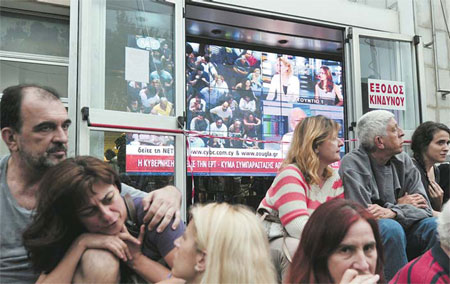Greeks strike over TV shutdown
|
Supporters sit outside the occupied Greek public ERT TV and Radio headquarters in Athens on Wednesday after the government's unexpected decision to immediately shut down the state broadcaster. Louisa Gouliamaki / Agence France-Presse |
Labor unions brand closure of ERT as a 'coup-like move'
Buses and subway trains stopped running in Athens on Thursday as Greek workers began a nationwide strike in protest against the "sudden death" of state broadcaster ERT, switched off in the middle of the night by the government.
Greece's two biggest labor unions plan to bring much of the near-bankrupt country to a standstill during the 24-hour strike against the decision by Prime Minister Antonis Samaras to close ERT.
They described the decision as a "coup-like move to gag unbiased information".
The government said its decision to shut the 75-year-old broadcaster is a temporary measure before its relaunch in a slimmed-down form.
But the move infuriated the coalition partners keeping Samaras in power, restoring an atmosphere of crisis in a country that had seemed to be emerging from the political drama accompanying one of the worst peacetime economic collapses in history.
Iron shutters blocked the entrance to state-run Athens subway stations early on Thursday and city buses did not run.
Several marches are expected to culminate in demonstrations outside ERT's headquarters, where workers have gathered since the closure was announced.
But there was little sign of private businesses joining the strike. City streets were full of commuters and cars, supermarkets were open and cafes were serving customers as usual.
"The lowest ERT employee is making in a day what I'm making in a week, so why should I strike for them?" said vegetable vendor Yannis Papailias as he sorted out his produce.
As waitress Maria Skylakou served coffee to customers she said, "Hundreds of thousands of people have lost their jobs. Who protested for them?"
Representing about 2.5 million workers, the unions have gone on strike repeatedly since Europe's debt crisis erupted in late 2009, although action has been less frequent and more muted lately, compared with last year when marches frequently turned violent. The last nationwide strike was in February.
The Hellenic Broadcasting Corporation ERT has lost viewers with the rise of commercial television, and its three nationwide channels had a combined audience share of only 13 percent. Many Greeks regard it as a wasteful source of patronage for political parties. But the abruptness with which it was shut - with newscasters cut off in mid-sentence - was a shock.
Samaras had earlier defended the closure, saying he will press ahead with plans to reform ERT and relaunch it as a leaner and more efficient organization, dismissing the broadcaster's defenders as hypocrites who would block needed reforms.
Shutting the broadcaster is proof of the political will needed to transform Greece from "a real Jurassic Park, the only place on earth where dinosaurs survived", he said.
The opposition's rhetoric was no less heated. Left-wing leader Alexis Tsipras, addressing protesting ERT workers in Greece's second-biggest city Thessaloniki, called on Greeks to defend democracy.
"What we experienced yesterday was unprecedented, not only for Greece but for all of Europe," Tsipras said. "Public television goes dark only in two circumstances: when a country is occupied by foreign forces or when there is a coup."
All 2,656 ERT employees are to lose their jobs. Some of them will be rehired by the new broadcaster, which is expected to employ about 1,200 people.
Reuters-AFP-AP
(China Daily 06/14/2013 page12)















